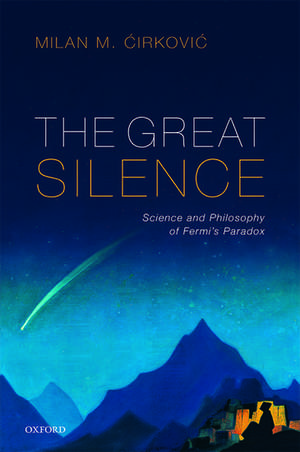The Great Silence: Science and Philosophy of Fermi's Paradox
Autor Milan M. Ćirkovićen Limba Engleză Hardback – 10 mai 2018
Preț: 272.83 lei
Preț vechi: 298.94 lei
-9% Nou
Puncte Express: 409
Preț estimativ în valută:
52.20€ • 54.51$ • 43.21£
52.20€ • 54.51$ • 43.21£
Carte tipărită la comandă
Livrare economică 25-31 martie
Livrare express 01-07 martie pentru 68.20 lei
Preluare comenzi: 021 569.72.76
Specificații
ISBN-13: 9780199646302
ISBN-10: 0199646309
Pagini: 432
Dimensiuni: 164 x 243 x 28 mm
Greutate: 0.7 kg
Editura: OUP OXFORD
Colecția OUP Oxford
Locul publicării:Oxford, United Kingdom
ISBN-10: 0199646309
Pagini: 432
Dimensiuni: 164 x 243 x 28 mm
Greutate: 0.7 kg
Editura: OUP OXFORD
Colecția OUP Oxford
Locul publicării:Oxford, United Kingdom
Recenzii
First and foremost, it offers the most extensive, meticulously researched, and scientifically current analysis of Fermi's paradox to date. It is also likely to become the go-to text on the theoretical foundations of SETI research. Ćirković expounds complicated scientific concepts in instructive and clear language without over-simplification, an achievement that makes the book accessible to a wide non-specialist audience.
It is a book that dreams bigly and boldly in space and time-a paragon of ambitious philosophy of science that does not rely on excessive quantification to be taken seriously. With this valuable study, Ćirković has sealed his place as a leading proponent of SETI research and, more importantly, as a preeminent champion of the scientific imagination.
Ćirković brings an encyclopedic familiarity of the professional and popular literature and history of the Fermi Paradox, including important contributions from science fiction... He also brings a wide background to the discussion, using a broad range of artistic and popular references to illustrate points.
This is a delightful and thought-provoking book that cleared my mind of clutter and confusion concerning Fermis Paradox and the Drake Equation.
I warmly recommend The Great Silence to any curious reader.
A much-needed critical analysis of the many logical and philosophical fallacies that pervade this fieldthe most important scientific topic that lacks any known subject matter... [a] speculative extravaganza.
If you've already read a few books about the search for extra-terrestrial intelligence, and you're looking for something a little deeper, then this would be a great book for you.
A detailed, logical, impartial and much-needed exploration, examining one of the most fascinating controversies of this (or any) era.
It is a book that dreams bigly and boldly in space and time-a paragon of ambitious philosophy of science that does not rely on excessive quantification to be taken seriously. With this valuable study, Ćirković has sealed his place as a leading proponent of SETI research and, more importantly, as a preeminent champion of the scientific imagination.
Ćirković brings an encyclopedic familiarity of the professional and popular literature and history of the Fermi Paradox, including important contributions from science fiction... He also brings a wide background to the discussion, using a broad range of artistic and popular references to illustrate points.
This is a delightful and thought-provoking book that cleared my mind of clutter and confusion concerning Fermis Paradox and the Drake Equation.
I warmly recommend The Great Silence to any curious reader.
A much-needed critical analysis of the many logical and philosophical fallacies that pervade this fieldthe most important scientific topic that lacks any known subject matter... [a] speculative extravaganza.
If you've already read a few books about the search for extra-terrestrial intelligence, and you're looking for something a little deeper, then this would be a great book for you.
A detailed, logical, impartial and much-needed exploration, examining one of the most fascinating controversies of this (or any) era.
Notă biografică
Milan M. Ćirković is a research professor at the Astronomical Observatory of Belgrade, and a research associate of the Future of Humanity Institute at Oxford University. His primary research interests are in the fields of astrobiology (Galactic habitable zone, SETI studies, catastrophic episodes in the history of life), risk analysis (global catastrophes, observation selection effects, epistemology of risk), and philosophy of science (anthropic principles, philosophy of physics, future studies).
